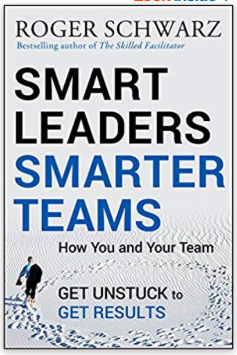“Smart Leaders, Smarter Teams”
Roger Schwarz, Ph.D.
272 pages
Available on Audible: 7 hours 53 minutes
The Wisdom in this book is best applied to the following within a dental office:
Patient Communication, Organizational Culture
Roger Schwarz earned his Ph.D. in organizational psychology from the University of Michigan. He is the founder of Roger Schwarz and Associaties and author of “The Skilled Facilitator” as well as “Smart Leaders, Smarter Teams.”
Roger Schwarz in his book: “Smart Leaders, Smarter Teams,” has written a recipe for dental professionals to create better patient relationships without knowing he wrote to dentists at all. Schwarz’s book is written to help teams get “unstuck.” In a dental office it can help providers who find themselves stuck experiencing poor alignment with their patients or teams to get unstuck.
“Smart Leaders, Smarter Teams” is a book that digs deep into two common mindsets. One mindset is called the “Unilateral Control Mindset.” Unilateral control is based on what an individual (usually the most senior person) thinks is the right answer. The other mindset is called the “Mutual Learning Mindset.” The Mutual Learning Mindset is based on two or more people coming to an agreed upon solution to a task or problem.
Dentistry is rarely an individual endeavor. In dentistry, a willing participant (patient) seeks out the aide of trained professional (dentist or hygienist). The fact that dentists are experts in dentistry and patients are not experts creates a ripe environment for unilateral control. The problem with one-sided control, however, is that many patients don’t know the correct questions to ask or the possibilities that exist to get them to the place they want to go. Dentists, not being trained on facilitation and drawing out peoples core values and desires are generally not well suited to do more than offer their expert opinion. Problems arise when the values of the dentists, and the values of the patient are not well aligned which leads to frustrations, distrust, and regret from one or both parties.
The Unilateral Control Mindset
 Dentists are experts in the field of dentistry trained by experts. Experts are adept at telling people what they need, what is possible, what is impossible and what people should do when faced with a problem that is within their area of expertise. Schwarz explains the expert mindset as having some characteristic traits:
Dentists are experts in the field of dentistry trained by experts. Experts are adept at telling people what they need, what is possible, what is impossible and what people should do when faced with a problem that is within their area of expertise. Schwarz explains the expert mindset as having some characteristic traits:
- “I understand the situation, those who disagree don’t.”
- “I am right, those who disagree are wrong.”
- “My motives are pure – yours may not be?”
- “I am not contributing to the problem.”
In dentistry, the dentists might have a slightly different take on the characteristics:
- “I understand the situation, the patient can not understand.”
- “I am right, and if you disagree, I need to explain it again.”
- “My motives are pure-the patient might be acting out of fear or pain.”
- “I am not contributing to the problem, and the patient should just trust me.”
In his book, Schwartz explains that the Unilateral Mindset leads to the following behavior (adapted to dentistry):
- “Win, don’t lose.”-Starting treatment is the goal
- “Be right.”-Diagnose Thoroughly and Explain my plan
- “Minimize expression of negative feelings”- Ignore the negative feelings from your patient.
- “Act rationally.” –assumes that if you present the facts, reasonable patients will do as you suggest.
There is another mindset, which is better at fostering collaboration between dentist and patient where optimal outcomes are desirable. It is called the “Mutual-Learning Mindset.”
The Mutual-Learning Mindset
Mutual Learning is based on a set of core values, these values are:
- Transparency
- Curiosity
- Informed Choice
- Accountability
- Compassion
Mutual Learning relies on the following assumptions:
- “I have information; so do others”-everyone can make a valuable contribution
- “Each of us sees things others don’t” –Each person brings unique experience and insight to the table.
- “Differences are opportunities for learning” –Differences help you appreciate and understand your teammate’s views.
- “People may disagree with me and still have pure motives.” –People see things from their point of view, and this variety of perspective helps a team achieve better results. A different opinion does not necessarily mean an ulterior motive.
- “I may be contributing to the problem” –You are not perfect, your mindset may be impeding your team.
“Don’t believe everything you think. You cannot be trusted to tell yourself the truth.” Jerry Bridges
Applying this knowledge to dentistry
Step One: We should begin observing ourselves and others. See if you can recognize the Unilateral Mindset and the Mutual Learning Mindset. The chances are that you already know how to do both but spend more time doing one over the other.
Step Two: Ask permission from some specific teammates to point out when they witness them using the two mindsets in both interaction among dental office staff and between dental professionals and patients.
Step Three: Learn the “Eight Behaviors” of smarter Teams (examples for dental teams):
1. State views and ask genuine questions
- “When possible I would like to save teeth, how important to you is to save each tooth?”
2. Share all relevant information
- “You have a cavity.”
- “I see evidence of trauma on your teeth.”
- “The bacteria that cause gum disease also contribute to cardiovascular disease.”
3. Use specific examples and agree on what “vague” words mean
- “This photograph shows the crack.”
- “A crack is an opening deep into the tooth that can weaken the tooth or accelerate decay.”
- “Decay means that your tooth is getting soft where it should be hard.”
4. Explain your reasoning and your intent
- “I would like to show you what a deep gum-reading looks like as well as a shallow healthier reading.”
- “In my experience seeing for yourself is much more informative than any words I can offer.”
5. Focus on the interests (those of your team and our patients), not on positions
- “My suggestion is that we address this now so that it doesn’t become a bigger, more complicated, more expensive and possibly more painful problem in the future.”
6.Test assumptions and inferences
- “I’m guessing because you replaced the tooth on the right side with an implant that you would prefer another implant to replace this tooth needing extraction as opposed to other options?”
- “Based on what you have said is it fair to say that you don’t think root canals work well in your mouth?”
7. Joint design next steps
- “Now that we have identified what needs to be fixed is there anywhere that you would like to begin?”
- “We have discussed many issues in your mouth, what are your thoughts about what we have learned?”
8. Discuss undiscussable issues (If it has to do with our businesses success we should be able to talk about it without fear.)
- “If we don’t control the cause of disease it is possible that the disease will reappear. Are you willing to work on your oral hygiene to ensure the best possible result.”
- “Your dental benefits are going to help offset some of the costs of care, but if we rely too much on them to guide our decisions, we may not be able to get as good of a result.
Step Four: Practice and help one another.
